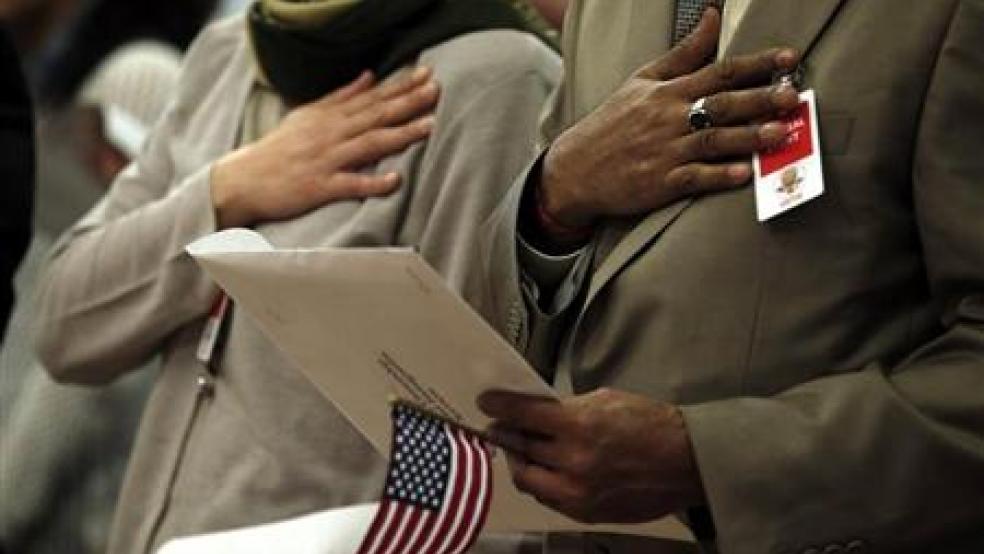WASHINGTON (Reuters) - Two leading Republican senators on Wednesday unveiled proposals requiring much tighter security on the U.S.-Mexico border before undocumented immigrants could gain legal status under the broad immigration bill the Senate is considering.
The two separate amendments by John Cornyn, the second-ranking Senate Republican, and Rand Paul, a potential 2016 presidential contender, are likely to draw fire from many Democrats who have said such provisions would erode the path to citizenship at the heart of the White House-backed bill.
Both senators would establish strict benchmarks for border security that would need to be met as a condition of granting legal status and a path to citizenship for some 11 undocumented immigrants.
"My idea takes border security a step further than anybody else in Congress," Paul, of Kentucky, said in a statement. His proposal would require Congress to write a border security plan and take votes each year on whether it has achieved its goals.
Cornyn, of Texas, would require the government to have the capability to monitor all portions of the southern border and stop at least 90 percent of people trying to cross the border illegally.
The full Senate is expected to begin work next week on the most sweeping overhaul of the U.S. immigration system in nearly three decades. The bill would authorize billions in new spending for enhanced border security and would create new visa programs for high- and low-skilled workers.
Both Republican and Democratic senators are likely offer a crush of amendments to bolster border security, considered by critics to be a weak link in broad immigration reform.
Skeptics of immigration reform warn of the risk of a repeat of 1986 when President Ronald Reagan signed sweeping legislation that offered amnesty to 3 million undocumented immigrants, but failed to obtain the level of border security that backers of the measure had anticipated. These critics complain that the 1986 amnesty ended up attracting more illegal immigrants.
Democrats have vowed to fight any amendments - including those on border security - that would create too many obstacles to the 13-year path to citizenship in the Senate bill.
The bipartisan "Gang of Eight" senators who wrote the immigration bill are trying to preserve Democratic priorities in the legislation while courting enough Republican votes to ensure its passage.
CHALLENGE IN HOUSE
Senator Marco Rubio, a member of the Gang of Eight and also a potential 2016 White House candidate, is leading the effort to reach out to Republicans.
An aide to Rubio said the Florida senator's staff has been "working closely with Cornyn's office" on parts of his border-security amendment for weeks. In a series of television and radio appearances, Rubio has defended the bill but also said he would like to some changes to it, including more stringent border provisions.
Rubio and Paul were among several Senate Republicans who met on Wednesday with conservative House of Representatives Republicans to discuss the immigration issue.
Comprehensive immigration is expected to face its biggest challenge in the Republican-led House, where many conservatives view the provision to grant legal status to undocumented immigrants as amnesty to people who broke the law.
In addition to Rubio and Paul, Senators Jeff Flake of Arizona, Ted Cruz of Texas, Mike Lee of Utah and Jeff Sessions of Alabama were also scheduled to attend the meeting with House Republicans.
Flake is a member of the Senate Gang of Eight. Paul has signaled he is open to supporting the bill but wants to see stronger border-security provisions and other changes.
Cruz and Lee are both skeptics of the immigration bill and Sessions is one of the Senate's most vocal critics of the legislation.
At a breakfast with reporters on Wednesday, Representative Tom Price of Georgia, a leading conservative voice in the House, expressed skepticism that a majority of Republicans in his chamber would support a bill that included a path to citizenship.
"I think at this point that would be highly unlikely because I don't think there's any trust of our conference in the administration to enforce current laws that are on the books as they relate to much of immigration," Price said.
(Editing by Vicki Allen)


